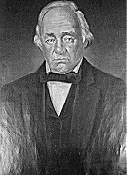Aaron Matson
Aaron Matson (* 1770 in Plymouth , Province of Massachusetts Bay , † July 18, 1855 in Newport , Vermont ) was an American politician . Between 1821 and 1825 he represented the state of New Hampshire in the US House of Representatives .
Career
Aaron Matson came to Cheshire County , New Hampshire, in his youth . He later became a judge at the probate court there. Politically, Matson was a member of the Democratic Republican Party . After their dissolution in the 1820s, he joined the faction around the then US President John Quincy Adams . From this movement emerged the short-lived National Republican Party and later the Whig Party . Between 1806 and 1818 Matson was several times as a representative of the Democratic Republicans deputy in the New Hampshire House of Representatives . Between 1819 and 1821 he was a member of the Executive Council .
In the congressional elections of 1820, which were held nationwide, Matson was elected for the fourth mandate from New Hampshire to the US House of Representatives in Washington, DC , where he succeeded Joseph Buffum on March 4, 1821 . After re-election in 1822, he was able to complete two consecutive terms in Congress until March 3, 1825 . During this time, in his annual message to Congress in 1823 , President James Monroe proclaimed the Monroe Doctrine , named after him , which would remain the guide of American foreign policy for almost 100 years.
After his time in Congress, Aaron Matson was once again a member of the parliament of his state in 1827 and 1828. After that he did not hold any other higher political offices. He died in Newport on July 18, 1855.
Web links
- Aaron Matson in the Biographical Directory of the United States Congress (English)
| personal data | |
|---|---|
| SURNAME | Matson, Aaron |
| BRIEF DESCRIPTION | American politician |
| DATE OF BIRTH | 1770 |
| PLACE OF BIRTH | Plymouth , Massachusetts |
| DATE OF DEATH | July 18, 1855 |
| Place of death | Newport , Vermont |

